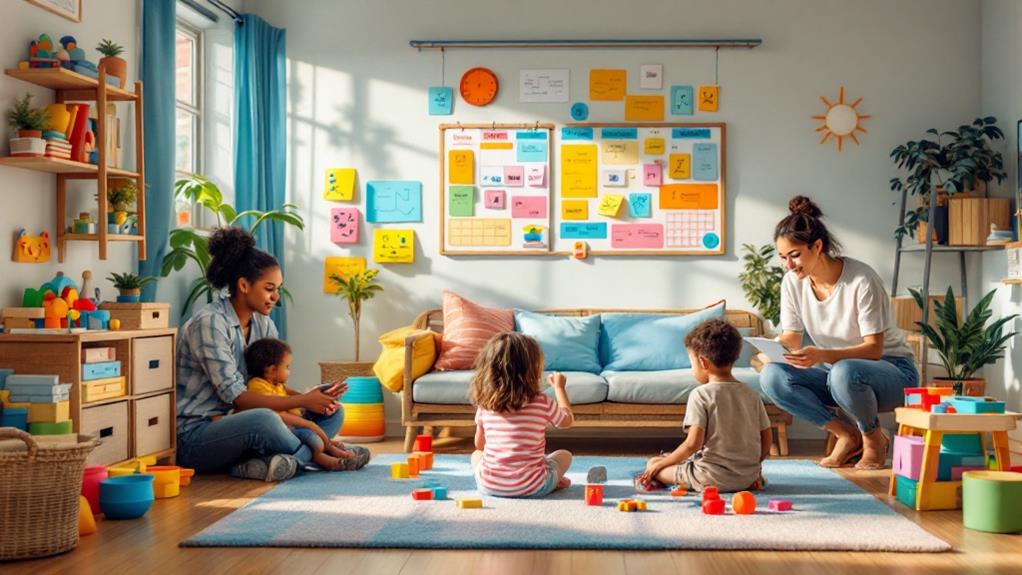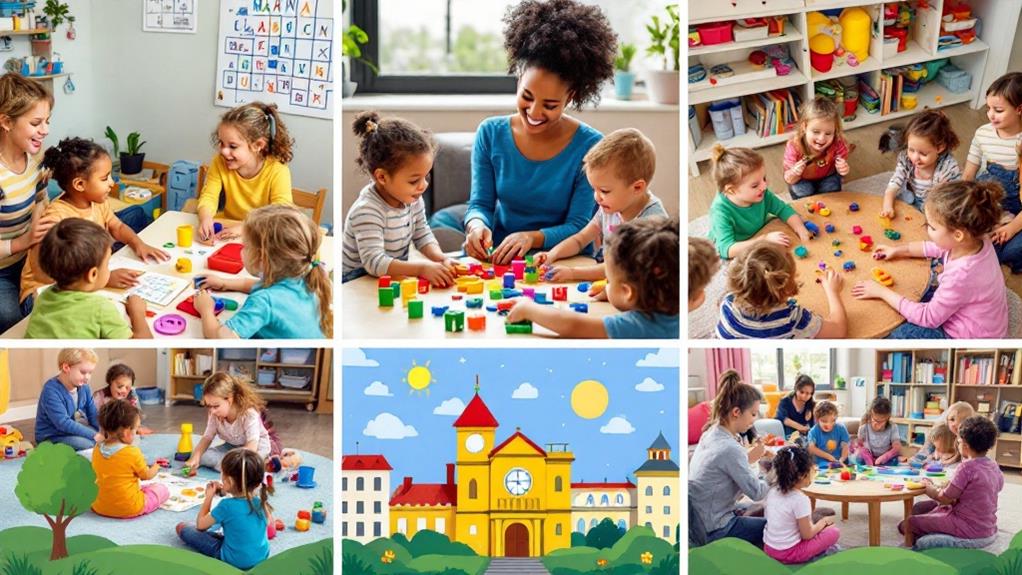Routine is essential for your child with autism or developmental delays. It creates a sense of safety and predictability, helping to reduce anxiety and boost confidence. Therapies like ABA, OT, and Speech Therapy enrich this structure. ABA reinforces positive behaviors, while OT promotes daily skill mastery. Speech Therapy enhances communication, paving the way for better social interactions. In West Des Moines, Ames, Ankeny, and Fort Dodge, these therapies work together to foster consistency and emotional stability. With a strong routine, you're not just aiding development; you're building a foundation for your child's future. There's so much more to discover about this journey!
Key Takeaways
- Consistent routines provide safety, security, and predictability, reducing anxiety for children with autism and developmental delays in Iowa communities.
- ABA therapy uses structured interventions and positive reinforcement to improve behavior, helping children develop essential skills within a predictable framework.
- Occupational Therapy (OT) enhances daily living skills and sensory processing, fostering independence through consistent routines in various environments.
- Speech Therapy focuses on communication skills, leading to increased self-esteem and social engagement, which is supported by structured therapeutic routines.
- Community resources in West Des Moines, Ames, Ankeny, and Fort Dodge offer tailored support, fostering connections and reinforcing the importance of structured environments.
Importance of Routine

A consistent routine can be a lifeline for children with autism and developmental delays. When you establish clear, predictable patterns in their daily lives, you create a sense of safety and security. This structure helps them navigate the world with greater ease, reducing anxiety and promoting confidence.
Imagine how comforting it's for them to know what comes next—mealtimes, playtime, and bedtime become anchors in their day.
By incorporating Applied Behavior Analysis (ABA), Occupational Therapy (OT), and Speech Therapy into their routines, you're providing invaluable support. These therapies can help reinforce positive behaviors and communication skills within a structured framework.
You're not just helping them; you're empowering them to thrive.
You might notice improvements in their ability to adapt to new situations as they learn to anticipate changes within their routine. Celebrate those small victories together!
When you commit to fostering consistency, you're not only enhancing their development but also enriching your connection with them.
Understanding Autism and Developmental Delays
Understanding the complexities of autism and developmental delays is fundamental for fostering an environment where your child can thrive. Each child is unique, and recognizing their individual strengths and challenges can be a game changer.
Autism often affects how children communicate, interact socially, and perceive the world around them. Developmental delays might impact their motor skills, cognitive abilities, or daily living tasks.
As a parent or caregiver, your support and understanding can create a safe space for your child to express themselves without fear of judgment. It's imperative to remember that while these conditions may present hurdles, they also open doors to incredible potential and unique perspectives.
By embracing your child's individuality, you can help them navigate challenges with resilience. Encourage open communication with educators and therapists, ensuring everyone involved in your child's life is on the same page.
This teamwork fosters consistency and understanding, essential for your child's growth. When you're informed and empathetic, you empower not just your child, but yourself as well.
Together, you can build a nurturing environment that celebrates progress, no matter how small, and lays the foundation for a brighter future.
Role of ABA Therapy

When it comes to supporting children with autism and developmental delays, Applied Behavior Analysis (ABA) therapy emerges as a powerful tool. This evidence-based approach focuses on understanding and improving specific behaviors through positive reinforcement and structured interventions. You'll find that ABA therapy fosters essential skills, enabling children to communicate, socialize, and engage more effectively with the world around them.
Imagine the joy of witnessing a child master a new skill, whether it's making eye contact or following simple instructions. These milestones aren't just small victories; they're stepping stones toward independence and confidence.
As a caregiver, you play a significant role in this journey. By collaborating with ABA therapists, you can create an environment where your child's unique strengths are celebrated and nurtured.
With consistency and routine, ABA therapy helps children thrive in various settings, from home to school. It's about creating a safe space for exploration and growth, allowing children to navigate their challenges while building resilience.
Benefits of Occupational Therapy
Occupational therapy offers a lifeline for children with autism and developmental delays, helping them access their potential in daily activities. Through tailored interventions, you can empower these children to engage in tasks that may seem challenging, like dressing, eating, or playing.
Imagine the joy on their faces as they achieve small victories, gaining confidence with each step.
OT focuses on developing fine motor skills, sensory processing, and social interactions. You'll observe how these improvements boost their independence and self-esteem. With guidance, children learn to navigate their environments, fostering a sense of belonging and accomplishment.
They're not just growing; they're thriving.
Moreover, occupational therapy creates a bridge between children and their families. You'll see how parents, equipped with strategies and insights, become more involved in their child's progress.
This collaborative approach nurtures a supportive atmosphere where everyone feels valued and motivated.
Impact of Speech Therapy

Speech therapy can be a transformative journey for children with autism and developmental delays, revealing the power of communication. It not only helps children express their thoughts and feelings but also fosters connections with others.
As you initiate this journey, you'll witness remarkable changes that can brighten both their lives and yours.
Here are some impactful aspects of speech therapy:
- Enhanced Communication Skills: Children learn to articulate their needs, which reduces frustration and empowers them in social situations.
- Increased Confidence: As they improve their speech, children gain self-esteem, making it easier for them to engage with peers and family.
- Improved Social Interaction: Speech therapy provides tools for effective conversation, allowing children to form meaningful relationships.
- Greater Academic Success: Stronger language skills translate into better performance in school, fostering a love for learning.
Creating Consistent Environments
Consistently creating supportive environments at home and in the community is essential for children with autism and developmental delays. You have the power to shape a world that feels safe and predictable for them. Start by establishing routines that your child can rely on each day. Whether it's a morning ritual or a bedtime story, these familiar patterns foster security and confidence.
As you work to create these consistent environments, consider the sensory aspects too. Bright lights, loud noises, or chaotic settings can be overwhelming. Aim for spaces that are calming and organized, allowing your child to thrive. Use visual schedules or charts to help them understand what comes next, easing changes that might otherwise cause anxiety.
It's important to involve others—family members, teachers, and caregivers can all play a role in reinforcing these supportive structures. Share your strategies and celebrate small victories together.
Remember, every effort counts. You're not just creating a space; you're building a foundation for growth and development. Your dedication to consistency and structure can ignite joy and learning in their lives, guiding them toward a brighter future.
Keep pushing forward; you're making a meaningful difference!
Community Resources in Iowa

When you seek support for your child with autism or developmental delays, Iowa offers a wealth of community resources that can make a significant difference in your family's journey. Connecting with these resources not only nurtures your child's growth but also helps you feel less alone.
Here are four key resources to evaluate:
- Autism Society of Iowa: This organization provides information, advocacy, and community events designed to support families steering through the challenges of autism.
- Early Access Program: If your child is under three, this program offers early intervention services tailored to meet their unique developmental needs, giving them a strong start.
- Local Support Groups: These groups foster connections with other parents who understand your challenges, allowing you to share experiences and strategies in a supportive environment.
- Therapy Centers: Numerous centers across Iowa specialize in ABA, OT, and speech therapy, providing structured and consistent support for your child's development.
Embrace these resources, knowing they're here to empower you and your child.
Parent and Caregiver Support
Steering through the challenges of supporting a child with autism or developmental delays can feel overwhelming, but you're not alone on this journey.
It's essential to remember that your role as a parent or caregiver isn't just about managing daily routines; it's also about nurturing your own well-being. By seeking out support networks, you can connect with others who truly understand your experiences.
Consider joining local support groups or online communities where you can share your feelings, exchange tips, and celebrate small victories together. These connections can be a lifeline, offering encouragement and insights that can make a significant difference.
Don't hesitate to reach out for professional guidance, too. Therapists and counselors can provide valuable strategies tailored to your unique situation, helping you navigate the emotional landscape of caregiving.
Conclusion
In the world of chaos, routine offers a lifeline for children with autism and developmental delays. While challenges may feel overwhelming, the structured support from ABA, occupational, and speech therapies creates a safe harbor amid the storm. You're not alone in this journey; countless resources and caring communities stand ready to help. Embrace the power of consistency and watch your child flourish, transforming daily struggles into moments of triumph and joy. Hope and progress are just around the corner.
